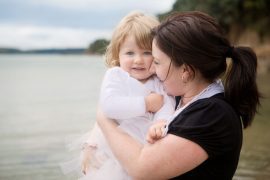Kohn also astutely observes that using punitive punishments and neglecting the needs of children through permissive parenting aren’t all that different, “Paradoxically, neglecting and punishing aren’t even really opposites. Both share the feature of offering absolutely no productive, respectful adult guidance of the sort that kids need.”
Imagine a small child who doesn’t want to wear sunscreen. A permissive parent would let that child go outside with no sun protection. An authoritarian parent would see the resistance as a sign of defiance and punish the child. An empathic parent would listen to why the child doesn’t like sunscreen and work with him to create a solution: is it the smell of this particular sunscreen? Would a hat and long-sleeve shirt be an adequate substitute?
Young children don’t understand abstract, long-term consequences like skin cancer, nor will young children realize how painful a sunburn can be. Similarly, punishing a child for having opinions and preferences won’t succeed in eradicating them. The rules we establish to keep our children healthy and safe aren’t negotiable. The strategies we use to enforce these rules, however, are.
Gentle Parenting
As Dr. Laura Markham explains, “Children are new on the planet, and they look to their parents for guidance. In fact, when they don’t get that guidance, they feel unsafe, and they push for it…but while limits are essential, it is never necessary to be less than kind and compassionate with children.”
Children are new on the planet, and they look to their parents for guidance. In fact, when they don’t get that guidance, they feel unsafe, and they push for it…
Gentle parenting is beneficial because it helps us to raise children who focus on how their behaviors affect other people. Authoritarian and permissive parenting both teach kids to focus on themselves. Children are either indulged to the point of entitlement or so focused on what punishment they will have to endure that they’re unable to focus outward.
Instead of failing to create the structure and boundaries our kids need, or doing so in a way that leaves little room for growth and learning, gentle parenting sets respectful limits through collaboration and an understanding of development. Helping a child to identify her emotions, process them, and problem solve builds competence and creates a deeper connection between parent and child.
Dr. Laura Markham observes, “…parents using empathy with limits are the most involved of any of the parenting styles. Which is probably why they’re happier parents.”
I think it’s also why they have the happiest kids.
Megan Stonelake is a therapist and parent coach who teaches parents all over the world how to become more peaceful. She has written extensively on peaceful parenting for Parent.co, Hey Sigmund, and The Huffington Post among others. You can follow her blog or schedule a session at her website. You can also follow her on Facebook and Twitter.










